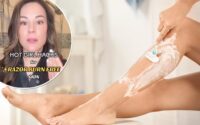I was brainwashed by toxic diet culture — now I celebrate my curves
She isn’t consuming diet culture anymore.
Aussie model Karina Irby is debunking the belief that skinny is the most desirable body type as she flaunts her figure on social media to promote body positivity.
In a vulnerable Instagram Story posted Tuesday, the 33-year-old swimwear designer revealed that while she didn’t have an “eating disorder” when she was younger, she engaged in “non-stop cardio” and “purposefully” ate less.
She blames “the media” for her “brainwashed” ideology, at one point believing beauty and thinness were a package deal. She said she was also convinced having friends and a boyfriend were contingent on a stick-like figure.
“It was so toxic and extremely unhealthy,” continued the influencer, who boasts 1.1 million Instagram followers. “Both mentally and physically.”

The blonde bombshell’s post included a throwback photo of herself sans her iconic curves.
Her admission comes at a pivotal time in pop culture which sees celebrities embracing ultra-thin frames. Kim Kardashian, for one, has been called out for her recent weight loss — with fans noticing the behind that put her on the map is now gone.
Social media has been shown to promote unhealthy obsessions with body image by encouraging diet culture and glorifying thinness.
While Irby insists she did not have a diagnosed eating disorder, disordered behavior and patterns are common among women and men. Nine percent of the global population suffers from an eating disorder in some capacity, affecting 28.8 million Americans alone, according to the National Association of Anorexia Nervosa and Associated Disorders.
Eating disorders are among the deadliest mental illnesses, second only to opioid overdoses, according to a 2011 study.

Irby, meanwhile, bites back at trolls who tell her to seek a “doctor” when she showcases snaps of her stomach. In a recent post, she posed in a skimpy bikini with screenshots of hurtful messages photoshopped around her.
Haters, who often spam her page with cruel comments, have told the model she looks “disgusting,” “repulsive” and like a “pig.”
“Real women don’t look like that,” one user declared.
“Just puked after seeing this atrocious despicable piece of skin,” said another.
“Wtf is wrong with your legs,” questioned someone else.
While the model said she “loves” to put herself out there on social media to help others, she took a brief hiatus from posting after users reportedly told her to “kill herself.” She called out jerks for “hiding behind their screens” and engaging in “disgusting” behavior.

Other influencers have admitted to promoting unhealthy body images and questionable weight loss methods.
“I used to be a really toxic fitness influencer,” content creator Hannah Barry stated in a recent TikTok video. “Now I’m just not so toxic, and I want to tell you some bulls – – t that goes on within the fitness industry that you probably don’t know about.”
Nicola Chan, a former bodybuilder, came forward last year to share her harrowing tale of infertility due to extreme dieting methods.
The 39-year-old body-confidence coach said she developed non-purging bulimia when she was just a teenager, but it wasn’t until she was deep into bodybuilding that she realized she might need help. She claimed she had lost her menstrual cycle and became temporarily infertile as a result of her restricted eating and avid gym-going habits.
Experts say eating disorders or disordered habits can vary in how they appear — while some people don’t look like they’re underweight, they could still be struggling.
Skipping meals, following rigid diets, intensely fixating on “healthy eating,” worrying about weight, body checking, using supplements or laxatives for weight loss, excessive exercising and more can be symptoms of disordered eating and lifestyle patterns.
Health problems, mental illness, issues with growth and development, relationship problems, substance abuse and even death are risks of eating disorders.
If you or someone you love is struggling with an eating disorder, you can get help. Call the National Eating Disorder Association helpline at (800) 931-2237 or visit nationaleatingdisorders.org.


